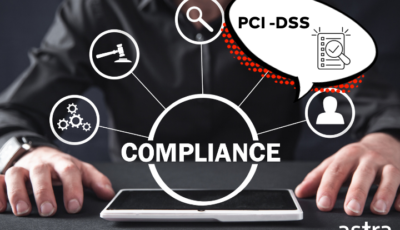PCI DSS (Payment Card Industry Data Security Standards) is a set of guidelines developed in 2004 by major credit card companies namely MasterCard, Visa, Discover, American Express, and JCB to ensure the security of cardholder data. Its primary objective is to reduce the risk of data breaches and fraud.
However, with the evolution and sophistication of cybercrime, PCI DSS has become a bare necessity. In fact, according to a recent report, there were 493+ million ransomware attacks globally in 2022 alone.
This is where PCI application security requirements step in.
Action Points
- PCI DSS provides a globally applicable, comprehensive security framework with specific requirements to safeguard cardholder data, ensuring a clear path to compliance.
- Non-compliance with PCI DSS incurs four primary consequences, including financial costs such as fines, investigation expenses, and additional security measures.
- PCI application security mandates network security, encryption, access control, monitoring, and vulnerability management for cardholder data protection, and compliance.
But before we jump in, let’s understand PCI DSS a little better.
Understanding PCI DSS
It provides a comprehensive framework for securing cardholder data and maintaining the integrity of payment card transactions. Here’s a deeper look at its role and applications in PCI compliance:
1. Security Framework:
It serves as a comprehensive security framework that outlines specific technical and operational requirements to safeguard cardholder data. It sets precise standards for everything from network configurations to access controls to eliminate ambiguity and provides organizations with a clear path to compliance.
2. Applicability:
PCI DSS applies to all entities that store, process, or transmit payment card data, which means it encompasses a broad spectrum of organizations, including merchants, service providers, and financial institutions. The global nature of this standard is incredibly valuable because it creates a universal language for data security.
3. Compliance Validation:
To achieve PCI compliance, organizations need to undergo periodic assessments and audits. These assessments help ensure uniform adoption of required security controls. Compliance validation methods include self-assessment questionnaires, external vulnerability scanning, and on-site audits by Qualified Security Assessors (QSAs).
What are the Consequences of Non-Compliance?
The 4 primary consequences of non-compliance with PCI DSS web application security requirements include:
1. Financial Costs:
In addition to the fines imposed for non-compliance, you are also liable for compensations related to investigating the breach, notifying affected individuals, providing credit monitoring services, and potential litigation.
Moreover, regaining compliance after a data breach comes with its own set of expenses including implementing security measures, hiring consultants, and undergoing additional assessments.
2. Legal Liability:
Non-compliance often comes with a boatload of legal liabilities, including lawsuits and regulatory actions ranging from fines and decrees to revocation of, licenses to process card-based payments by the Federal Trade Commission (FTC).
3. Loss of Reputation:
Data breaches and non-compliance with PCI DSS web application security requirements can severely damage your reputation. Customers, vendors, and other business partners lose trust in your security measures, resulting in a loss of business and future revenue.
4. Loss of Payment Card Acceptance:
Your ability to accept certain brand cards like Visa, MasterCard, etc., may be revoked by the respective companies if you repeatedly fail to comply with PCI DSS. This leads to multiple complications in the processing of orders, vendor payouts, and all inflow-outflow of finances.
Why is Astra Vulnerability Scanner the Best Scanner?
- Runs 8000+ tests with weekly updated scanner rules
- Scans behind the login page
- Scan results are vetted by security experts to ensure zero false positives
- Integrates with your CI/CD tools to help you establish DevSecOps
- A dynamic vulnerability management dashboard to manage, monitor, assign, and update vulnerabilities from one place.
- Helps you stay compliant with SOC2, ISO27001, PCI-DSS, HIPAA, etc.
- Integrates with Slack and Jira for better workflow management
- Trusted by the brands you trust like Agora, Spicejet, Muthoot, Dream11, etc.

What Are The 12 PCI Application Security Requirements?
1. Establish and Maintain a Secure Network:
Create and consistently maintain a secure network. Use firewalls to segment cardholder data from other networks, change default passwords, and ensure secure network configurations to prevent unauthorized access. Regularly update and patch network systems to address known vulnerabilities.
2. Encrypt Stored Cardholder Data:
Protect stored cardholder data by implementing strong encryption measures. Use strong encryption protocols and mechanisms like IPSEC, SSL/TLS, SSHIPSEC, SSL/TLS, and SSH to ensure that sensitive information is safe from unauthorized access or data breaches.
3. Manage Vulnerabilities:
Regularly address vulnerabilities in your systems and PCI web applications. Implement anti-virus software, conduct system patching, and maintain a robust system of threat detection and remediation.
4. Enforce Access Control Measures:
Implement strong access control measures within your organization. This involves assigning unique user IDs and employing multi-factor authentication to ensure that only authorized individuals have access to sensitive data.
5. Continuously Monitor and Test Networks:
Regularly monitor and test your security systems. Deploy intrusion detection systems and conduct periodic security testing, such as penetration testing, to identify vulnerabilities.
6. Develop Comprehensive Security Policies:
Create and communicate a comprehensive security policy. This policy should cover all aspects of PCI compliance security requirements and serve as a guide for all employees and relevant parties, outlining their responsibilities and the organization’s security protocols.
7. Limit Access to Cardholder Data:
Restrict access to cardholder data on a “need-to-know” basis as per the Principle of Least Privilege. Only individuals whose job responsibilities require access should be granted permission to view or handle sensitive information.
8. Monitor and Test Networks Regularly:
Focus specifically on network security by regularly testing and monitoring your network systems to identify and address vulnerabilities and threats. Implement Intrusion Detection Systems (IDS), and maintain detailed logs of security events, including access attempts, configuration changes, and system activities.
9. Secure Physical Access:
Implement security measures to restrict physical access to areas containing cardholder data. This can involve access control systems, visitor logs, and surveillance cameras to monitor and control access to physical locations housing sensitive information.
10. Encrypt Data Transmissions:
Ensure that cardholder data is encrypted during transmission. For applications that handle online transactions, it is crucial to use encryption to safeguard sensitive information as it travels across networks.
11. Update Security Policies Ongoing:
Keep your security policies up-to-date. Regularly review and update your security policies to adapt to the evolving threat landscape and incorporate new security measures and best practices.
12. Maintain a Structured Vulnerability Management Program:
Establish a structured program for managing vulnerabilities. Start by conducting regular scans and assessments of your systems and applications to identify vulnerabilities and promptly address them.
How can Astra Help?
As a trusted PCI Penetration Tester, Astra’s team strives to continuously eliminate vulnerabilities. Our comprehensive suite of cybersecurity solutions blends automation and manual expertise to run 8000+ tests and PCI compliance checks, ensuring complete safety, irrespective of the threat and attack location.
With zero false positives, seamless tech stack integrations, and real-time expert support, we strive to make PCI Compliance and cybersecurity simple, effective, and hassle-free for businesses worldwide.
Conclusion
PCI DSS is an indispensable framework developed by major credit card companies to secure cardholder data in a dynamic and ever-evolving cybersecurity landscape. Adhering to the 12 critical PCI application security requirements is not just a choice but a necessity for organizations, as it safeguards against data breaches, fraud, and potential liabilities.
FAQs
What is PCI security?
PCI security, or Payment Card Industry Data Security Standard, is a set of requirements and best practices designed to safeguard sensitive cardholder data during payment transactions. It ensures the protection of data and reduces the risk of fraud and data breaches.
Who issues PCI standards?
The Payment Card Industry Security Standards Council (PCI SSC) issues PCI standards. It is a global organization responsible for establishing and maintaining security standards for payment card transactions to protect cardholder data and enhance payment security.
















